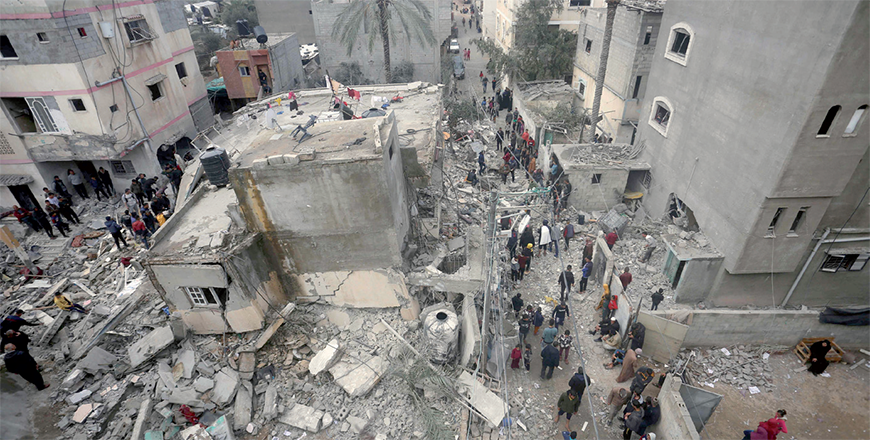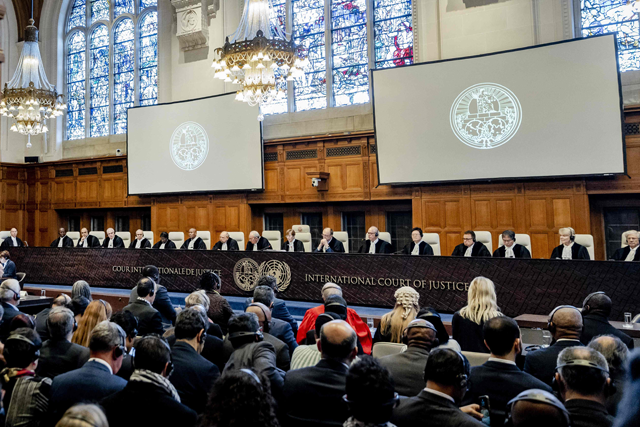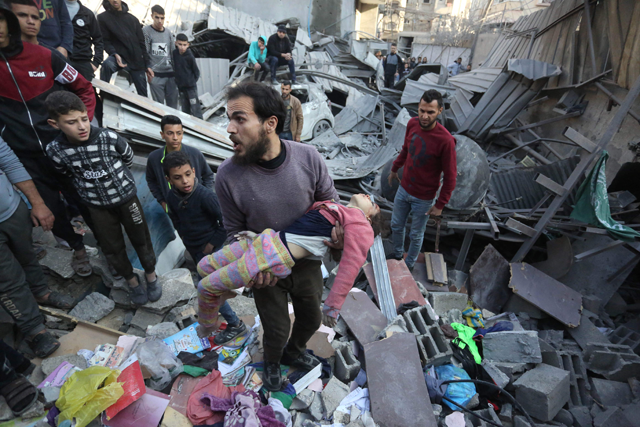You are here
Mediator says Gaza truce 'not promising' as Israel rejects calls to spare Rafah
By AFP - Feb 19,2024 - Last updated at Feb 19,2024

People search for victims in the rubble of the Baraka family home in Deir Al Balah in the central Gaza Strip after it was hit in an Israeli air strike on Sunday (AFP photo)
GAZA STRIP, Palestinian Territories — Mediator Qatar acknowledged on Saturday that prospects for a new pause in Israel's war with Hamas were "not really promising" as Israel rejected appeals to hold off on a threatened assault on the Gaza city of Rafah.
Truce efforts intensified this week as Qatar and fellow mediators Egypt and the United States scrambled to secure a ceasefire before Israeli forces enter Rafah, the last major population centre in Gaza untouched by Israeli ground troops.
Qatari Prime Minister Mohammed Bin Abdulrahman Al Thani, who met with negotiators from both Israel and Hamas this week, said efforts for a ceasefire had been complicated by the insistence of "a lot of countries" that any new truce involve further releases of hostages.
"The pattern in the last few days is not really very promising," he said at the Munich Security Conference.
His assessment came as Hamas threatened to suspend its involvement in talks unless relief supplies are brought into the north, where aid agencies have warned of looming famine.
"Negotiations cannot be held while hunger is ravaging the Palestinian people," a senior source in the Palestinian militant group told AFP, asking not to be identified as he is not authorised to speak on the issue.
Earlier, Hamas chief Ismail Haniyeh reiterated the group's demands, which Netanyahu called "ludicrous".
They include a complete pause in fighting, the release of Hamas prisoners and the withdrawal of Israeli forces from Gaza.
Israel said on Saturday it detained 100 people at one of Gaza’s main hospitals after troops raided the complex, with fears mounting for patients and staff trapped inside.
At least 120 patients and five medical teams are stuck without water, food and electricity in Nasser Hospital in Gaza’s main southern city of Khan Yunis, according to the Hamas-run health ministry.
Israel has for weeks concentrated its military operations in Khan Yunis, the hometown of Hamas’s Gaza leader Yahya Sinwar, the alleged architect of the October 7 sudden attack that triggered the war.
Intense fighting has raged around Nasser Hospital — one of the territory’s last major medical facilities that remains operational.
The Israeli military said troops entered the hospital on Thursday, acting on what it said was “credible intelligence” that hostages had been held there. It later acknowledged it found no firm evidence that they had.
The power was cut and the generators stopped after the raid, leading to the deaths of six patients due to a lack of oxygen, according to Gaza’s health ministry.
A witness, who declined to be named for safety reasons, told AFP the Israeli forces had shot “at anyone who moved inside the hospital”.
‘We need food now’
In northern Gaza, many are so desperate for food they are grinding up animal feed.
“We’re going to die from hunger, not by bombs or missiles,” said Mohammed Nassar, 50, from Jabalia in northern Gaza.
As a much-needed delivery of supplies arrived in southern Gaza Saturday, the UN warned that Gazans are close to famine.
Palestinians in Rafah have grown so hungry that they are stopping aid trucks to take whatever they can manage, according to the UN.
With intense fighting around Khan Yunis, even more people are fleeing into Rafah, despite the risk of an imminent invasion there too, according to the UN agency for Palestinian refugees.
The promised military operation has ignited speculation that Palestinian refugees could be forced into neighbouring Egypt.
After satellite images appeared to show extensive construction work along the border, an Egyptian human rights monitor claimed preparations were underway for a camp to receive displaced Palestinians in the Sinai Peninsula.
Egypt has publicly denied any such plans and since the start of the war has refused to open its border to refugees.
Related Articles
THE HAGUE — The UN's top court on Friday said Israel must do all it can to prevent genocide in its war with Hamas and allow aid into Gaza, a
GAZA STRIP, Palestinian Territories — Fighting raged on Saturday across Gaza, where displaced Palestinians said they were "exhausted" with n
GAZA CITY, Palestinian Territories — Israel continued with its attack on Gaza on Monday, including in far-southern Rafah, despite US warning














